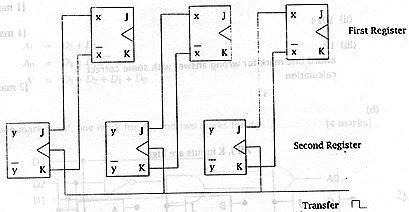| 5. |
(a) |
(i) How many flip-flops are required to build
a binary counter circuit that can count from 0 to 1023? |
[1] |
|
|
10 |
[1] |
|
|
(ii) What would be the MOD number of the
counter? |
[1] |
|
|
1024 |
[1] |
|
|
(iii) If the counter is initially at zero,
what count will it hold after 2060 pulses? |
[2] |
|
|
12 |
|
|
|
award one mark for wrong
answer with some correct calculation |
|
|
[2
marks] |
|
|
|
|
|
(b) Draw a 3-bit asynchronous down
counter using negative edge triggered JK flip flops. (Label all of the inputs and outputs
clearly.) |
[8] |
|
All J, K
inputs are high |
|
|

|
|
|
award one mark
for each of the following features: |
|
|
|
correct number of FFs |
|
|
|
correct location of
outputs |
|
|
|
correct connection
from one flip flop to the next |
|
|
|
all j inputs high |
|
|
|
all k inputs high |
|
|
|
negative edge
triggering |
|
|
|
first clock input |
|
|
|
other output left
unconnected |
|
|
[8
marks] |
|
|
|
|
|
(c) Draw the circuit diagram for
the synchronous parallel transfer of data from one 3-bit register to another using
positive edge triggered JK flops. (Label all of the inputs and outputs clearly.) |
[8] |
|

|
|
|
award one mark
for each of the following features: |
|
|
|
correct number of FFs
in first register |
|
|
|
correct number of FFs
in second register |
|
|
|
correct labelling of
outputs in first register |
|
|
|
correct labelling of
outputs in second register |
|
|
|
all J inputs for
second connected to outputs in first |
|
|
|
all K inputs for
second connected to negated outputs in first |
|
|
|
positive edge
triggering |
|
|
|
clock not connected to
first register |
|
|
Note that
there are other ways of solving this problem: some care may be required in evaluating
alternative answers. |
|
|
[8
marks] |
|

